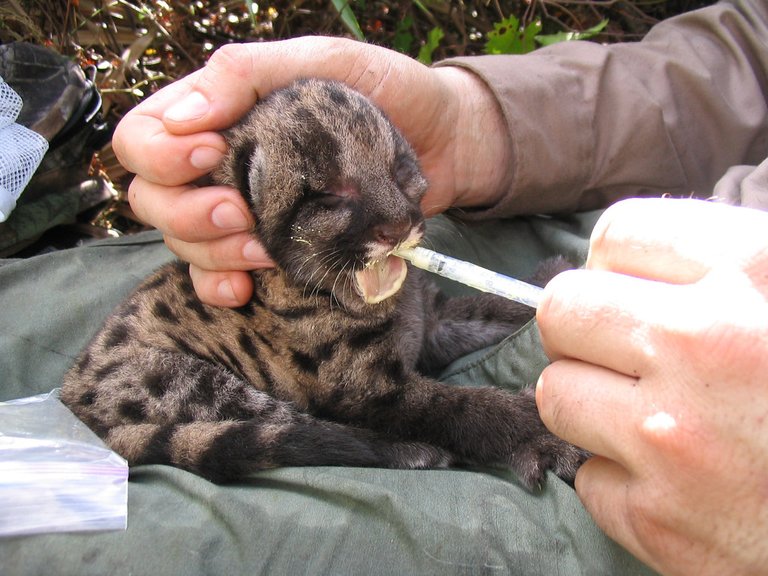The Essence of Deworming your Pet.
Every good pet owner understands the need to keep pets healthy and happy, to get this done, you have to make sure that your pet is free from parasites. Speaking of parasites, worms happen to be a very common problem that affects pets, although so many pet owners do not pay serious attention to it, when it is left untreated, it create serious health challenges.

flickr.com
Let's talk a bit about worms.
Worms are an internal parasite that resides in the body of a pet. Speaking of dogs, for instance, different types of worms could affect them, we have the likes of tapeworms, roundworms, hookworms, and there is even whipworms. Worms can get into the body of a pet through infected feces, contaminated soil, or ticks and fleas. Heavy infestation of worms may result in death, so it isn't a thing to be toiled with.
Deworming is a procedure for getting rid of worms from the body of a pet. This process involves the administration of appropriate medications to pets to help them get rid of existing parasites like whipworms, hookworms, tapeworms, and roundworms.
The worms dig into the intestines of the animals and affect the digestive system in such a way that the pet could begin to lose so much weight, get anemia, and a situation of terrible diarrhea. Deworming plays a very strong role when it comes to the sustaining of your pet's lifestyle.
Pet parents usually try to watch out for signs to help them know if their pet has intestinal worms or not. Some of the symptoms to watch out for are; Coughing, bloated stomach, absence of appetite, bleeding, tiredness, vomiting, anemia, and visible worm segments around the anal area.

flickr.com/
The deworming of your pet is dependent on several factors like health status, lifestyle, age, and the type of deworming medication used. On a general note, however, it is advisable to deworm an adult dog at least two times a year or within 3-4 months consistently, but if your pet resides in an area where there is a high chance of contracting worms, they may require constant and consistent deworming.
Puppies, however, require more consistent deworming than adult puppies, they are susceptible to worms they may have already gotten from their mother. Puppies need to be dewormed at weeks 2,4,6 and 8, then from there, they need constant deworming every 3-4 weeks until they become 4 months old and then they can be dewormed like adult dogs.
In the system of keeping your pet healthy, aside from deworming adequately, you also have to practice some safety procedures to help sustain the health of your pet.
- Prevent your pet from scavenging or hunting.
- Treating your pets for fleas and ticks as soon as noticed.
- Keep your pet far away from contaminated soil.
- Clean up your pet's feces as soon as you can.
It wouldn't be a bad idea to check out some of these worms individually and how they could find their way to our dear pets.
Hookworms: Hookworms feed on intestinal blood and have themselves multiply in the intestine. They come with symptoms like; weakness, tiredness, diarrhoea, and pale gums.
Whipworms: It is not very easy to notice these pets as they have an extremely thin structure, they enter into the intestine of pets through water or food that is already contaminated. These worms could cause severe anemia, bleeding, and so on.
Roundworms: Usually light brown or off-white colored worms that could be found in the excreta of a dog. These worms find their way into the intestine, then they remain there and feed on the same. They contribute to symptoms like; weakness, potbelly, weight loss, and stomach pain.
Tapeworms: These worms are white or cream, and they a look-alike of cucumber seeds, and they can be found around the anus region. The most common symptom caused by this tapeworm is itching around the anus of the dog.
While deworming is good, pet owners must also know that sometimes deworming makes dogs very uncomfortable or sick, usually for just a short while. Symptoms like; mild diarrhea, vomiting, temporary loss of appetite, and visible worms in the dog's stool are expected, but it isn't anything to worry your head about as these symptoms usually disappear within 12-24 hours on their own.
However, in some cases, the dewormer used can also turn out harshly on the puppy and cause a more serious allergic reaction like; difficulty breathing, collapsing, excessive drooling, and unsteady walking. Also, if the dog or puppy has been infested heavily with worms, the process of deworming could result in an intestinal blockage with dead worms, the occurrence of this situation may require an operation. In these cases, it is better to visit the vet as soon as possible.
Thanks for this informative post, I was aware but this has enlightened me much further than I would have cared to pursue on my own!
I am excited to read this!! thanks for your time too.
Thanks for your contribution to the STEMsocial community. Feel free to join us on discord to get to know the rest of us!
Please consider delegating to the @stemsocial account (85% of the curation rewards are returned).
Thanks for including @stemsocial as a beneficiary, which gives you stronger support.